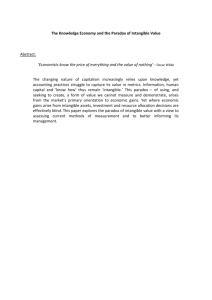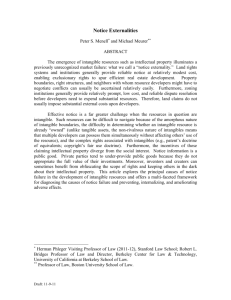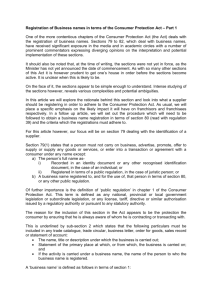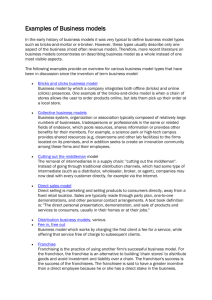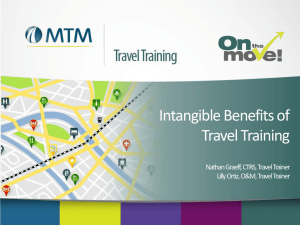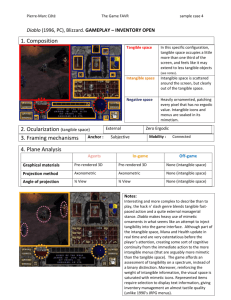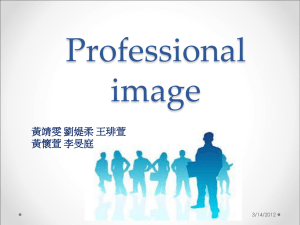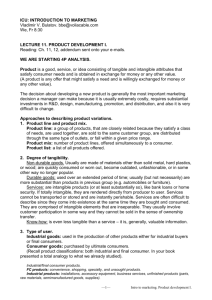licensed intangible property that is used in a state satisfies the nexus
advertisement
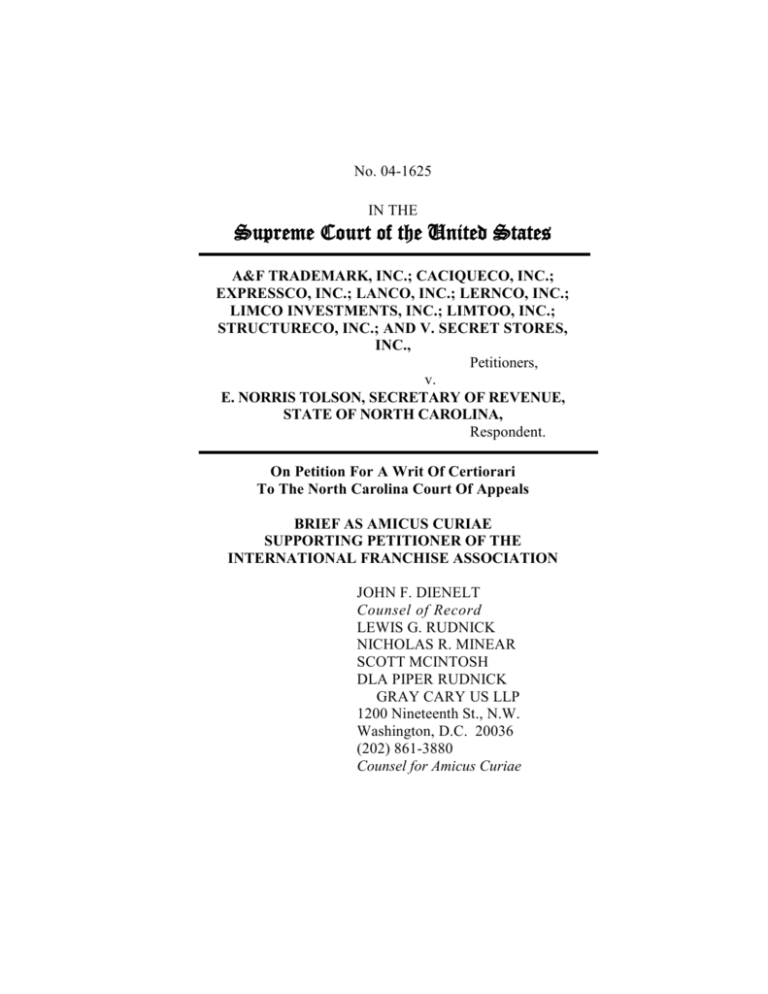
No. 04-1625 IN THE Supreme Court of the United States A&F TRADEMARK, INC.; CACIQUECO, INC.; EXPRESSCO, INC.; LANCO, INC.; LERNCO, INC.; LIMCO INVESTMENTS, INC.; LIMTOO, INC.; STRUCTURECO, INC.; AND V. SECRET STORES, INC., Petitioners, v. E. NORRIS TOLSON, SECRETARY OF REVENUE, STATE OF NORTH CAROLINA, Respondent. On Petition For A Writ Of Certiorari To The North Carolina Court Of Appeals BRIEF AS AMICUS CURIAE SUPPORTING PETITIONER OF THE INTERNATIONAL FRANCHISE ASSOCIATION JOHN F. DIENELT Counsel of Record LEWIS G. RUDNICK NICHOLAS R. MINEAR SCOTT MCINTOSH DLA PIPER RUDNICK GRAY CARY US LLP 1200 Nineteenth St., N.W. Washington, D.C. 20036 (202) 861-3880 Counsel for Amicus Curiae TABLE OF CONTENTS PAGE TABLE OF AUTHORITIES ......................................................... ii INTEREST OF THE AMICUS CURIAE ..................................... 1 SUMMARY OF ARGUMENT ..................................................... 4 ARGUMENT ................................................................................. 5 I. THIS COURT SHOULD DECIDE WHETHER A LICENSED INTANGIBLE PROPERTY THAT IS USED IN A STATE SATISFIES THE NEXUS REQUIREMENTS OF THE COMMERCE CLAUSE ..................................................... 5 II. THE DECISION BELOW PERMITS STATE TAXATION OF COMPANIES THAT IMPOSE NO COSTS ON AND RECEIVE NO SERVICES FROM THE TAXING STATE, EMASCULATING THE COMMERCE CLAUSE REQUIREMENTS THAT A STATE TAX MUST BE RELATED TO SERVICES FURNISHED BY THE TAXING STATE………………………………..…. ......................... 8 III. CONCLUSION ................................................................... 9 i TABLE OF AUTHORITIES CASES: PAGE A&F Trademark, Inc. v. Tolson, 605 S.E.2d 187 (N.C. Ct. App. 2004) ............................... 7 Complete Auto Transit, Inc. v. Brady, 430 U.S. 274 (1977) .................................................. 4, 5, 8 Geoffrey, Inc. v. South Carolina Tax Comm’n, 313 S.C. 15, 437 S.E.2d 13, cert denied, 510 U.S. 992 (1993) .......................................................... 7 Lanco, Inc. v. Director, Div. of Taxation, 21 N.J. Tax 200 (Tax Ct. 2003) ................................................................ 7 Quill Corp. v. North Dakota ex rel. Heitkamp, 112 S.Ct. 1904 (1992) ................................................... 7, 9 CONSTITUTION: U.S. CONST. art. I, §8, cl. 3 .......................................... 3 ii No. 04-1625 IN THE Supreme Court of the United States A&F TRADEMARK, INC.; CACIQUECO, INC.; EXPRESSCO, INC.; LANCO, INC.; LERNCO, INC.; LIMCO INVESTMENTS, INC.; LIMTOO, INC.; STRUCTURECO, INC.; AND V. SECRET STORES, INC., Petitioners, v. E. NORRIS TOLSON, SECRETARY OF REVENUE, STATE OF NORTH CAROLINA, Respondent. On Petition For A Writ Of Certiorari To The North Carolina Court Of Appeals BRIEF AS AMICUS CURIAE SUPPORTING PETITIONER OF THE INTERNATIONAL FRANCHISE ASSOCIATION INTEREST OF THE AMICUS CURIAE1 Pursuant to Rule 37.2 of the Rules of this Court, the International Franchise Association (“IFA”) respectfully submits this brief as amicus curiae in support of Petitioner. Because IFA’s members are licensors and licensees of 1 No counsel of a party authored this brief in whole or in part, and no person or entity, other than the amicus curiae or its members, made a monetary contribution to the preparation or submission of this brief. All parties have consented to the filing of this brief, and the letters of consent of both Petitioners and Respondent have been filed with the Court pursuant to Rule 37.2(a). 1 intangible property, IFA has a substantial interest in the outcome of this case and is able to provide an additional and broader perspective on the issues presented. IFA believes this brief will assist the Court in assessing the issues presented by the petition. IFA is a trade association of more than 1,000 franchising company and 8,000 franchisee members, representing over 75 industries, in many of which franchising is the predominant method of distribution of goods and services. IFA members are franchisors and franchisees of a large majority of the franchised service businesses in the United States. The over 767,000 franchised businesses in the U.S. account for more than one and a half trillion dollars of economic output (about 9.5% of the private-sector economic output). Franchisors and their franchisees directly employ almost 10 million people, and indirectly are responsible for the creation of over 18 million jobs. The largest franchisors have more than 5,000 outlets, the smallest fewer than 10. The great majority of the approximately 2,500 franchisors operating in the United States are small companies, with fewer than 50 franchised outlets. Franchisee members own from one to more than 50 franchised outlets. Franchising is a successful business relationship. Central to the relationship between a franchisor and its franchisees is a shared trade identity. This shared trade identity is established and maintained by the franchisor’s license of its trademark, trade dress and other intellectual property (i.e., intangible property) to each of its franchisees. Thus, each of the hundreds of thousands of franchise relationships that exist in the United States involves a license of intangible property. The great majority of those licenses cross state lines. Most franchisors own no property in the state in which their franchisees operate, do not maintain offices there and employ no residents of those states. A franchisor’s employees 2 may make occasional visits to its franchisee’s place of business to assist the franchisee in opening his business and to inspect the franchisee’s performance and furnish advice and guidance, but the duration of such visits normally is a few hours or days. The services that a franchisor furnishes to its franchisees, and communication among a franchisor and its franchisees, are implemented almost entirely at the franchisor’s principal offices and through interstate communications media. Most franchisors do not rely on the states of their franchisees’ domicile for any services and impose no costs on these states. The franchise relationship has evolved over the last half century with the understanding that the franchisor is not subject to state income taxes (other than those imposed by the franchisor’s domicile) on the royalty income paid to the franchisor by franchisees located in a different state. Prior to the late 1980’s, with rare exception, the states did not seek to tax such income, unless the franchisor clearly established a traditional nexus by owning or leasing real estate, operating its own outlets, or maintaining an office or employees in the taxing state. The pricing of franchises has developed on the basis that the franchisor’s net income will be taxed only by its state of domicile. If every state where a franchisor has granted franchises may tax its income attributable to that state, the franchisor will be subject to costly compliance burdens and overlapping taxes. Much is at stake for thousands of businesses, franchising companies, their franchisees and other licensors and licensees of intangible property across state lines, in the resolution of the issues presented by Petitioners in their Petition for Certiorari. Accordingly, this Court should grant the motion of IFA to file an amicus brief in support of the petition for certiorari. 3 SUMMARY OF ARGUMENT In the decision below, the North Carolina Court of Appeals diminished to the vanishing point the limitations imposed by the Commerce Clause (U.S. CONST. art. I, §8, cl. 3) on the authority of states to impose income taxes on persons engaged in interstate commerce. The court of appeals has held that the mere presence of intangible property satisfies the “substantial nexus” requirement under the Commerce Clause for the imposition of state income tax. This decision radically expands the classes of persons, relationships and transactions potentially subject to state income taxation. The decision has enormous implications for the many thousands of businesses engaged in interstate franchising and licensing of intangible property, a rapidly expanding part of the American economy. If followed, that decision will subject licensors of intangible property in interstate commerce to income taxation by every state in which goods or services exploiting the licensed intangible property are sold. This result will be a radical departure from the historical understanding of the reach of state taxing authority and a significant increase in the tax liabilities and burdens of compliance of thousands of American businesses to an extent that could not have been foreseen. Unless reviewed by this Court, the continuing uncertainty with respect to these issues will impose high costs on companies forced to operate in an environment in which their state tax liabilities are unclear. The decision below is based on an essentially meaningless test for the Commerce Clause requirement that taxes must be “fairly related to the services provided by the State” (Complete Auto Transit, Inc. v. Brady, 430 U.S. 274, 279 (1977)), by holding that requirement to be met with respect to a licensor, with no physical contact with the taxing state, if the state furnishes services to its licensee operating within the state. Every state tax will pass this test, for every licensee of 4 intangible property will receive some services from the state in which it operates (and for which it pays taxes to the state). The effect of this interpretation of Complete Auto Transit, is to write out of the Commerce Clause any meaningful limitations on the authority of states to impose taxes on out-of-state businesses that derive no services from the taxing state, significantly altering the historical understanding of the parameters of state taxing authority. Such taxation is fundamentally unfair, because it permits a state to tax an out-of-state business that imposes no costs on the state and derives no services from the state. The decision below is based on rationales that greatly expand the constitutional power of states to tax interstate commerce and raise issues of great importance under the Commerce Clause. These issues have enormous significance for a large and growing segment of American business. These are compelling reasons for this Court’s review. ARGUMENT I. THIS COURT SHOULD DECIDE WHETHER A LICENSED INTANGIBLE PROPERTY THAT IS USED IN A STATE SATISFIES THE NEXUS REQUIREMENTS OF THE COMMERCE CLAUSE In holding that the mere use of intangible property in a state establishes the requisite constitutional nexus for the state to tax the owner of such property, the Court of Appeals of North Carolina greatly extended the reach of state taxing authority beyond its historically accepted limits. The court below concluded that the “substantial nexus” required by the Commerce Clause does not require a physical presence of the taxpayer within the state, merely the presence of the taxpayer’s intangible property in the state. The decision, if 5 followed, significantly expands the authority of states to tax thousands of businesses in a broad range of interstate relationships and transactions. Stretched to its logical boundaries, for example, the decision authorizes a state to tax the income of an athlete, who has licensed a sporting goods company to manufacture and sell equipment bearing the athlete’s name, solely on the basis that the equipment is sold through retail outlets located in the state. Similarly, the decision permits a state to tax an out-of-state playwright whose copyrighted work is performed in the state. Licensors of intangible property would thus bear state tax burdens that they have not historically borne. If a tax return is not filed, no statute of limitations will limit the period for which taxes, interest and penalties may be due. The alternative, capitulating to the anticipated avalanche of state taxes on income generated by licensors of intangible property, is equally unpalatable and will severely distort the economic relationships of licensors and licensees of intangible property. The situs of the intangible property of a licensor of such property historically has been considered located in the jurisdiction where its management activities occur, where it receives payment for use of the property, where it negotiates or enters into contracts that generate revenue attributable to the property, or where it performs the activities that create and maintain the value of the property. Such activities may include advertising, product development and testing, and maintaining a disciplined, competitive business system which enhances the value of the licensees’ businesses. In most cases, these activities are performed by the licensor at its principal office, rather than in the locale of a licensee. In many cases, the licensor has no contact with the state of the licensee. In a typical franchise relationship, the activities a franchisor performs in the franchisee’s state are limited to assistance in initially opening the franchisee’s business and 6 occasional visits to the franchisee’s place of business. The duration of such visits is normally a few hours. The overwhelming majority of the franchisor’s activities, as measured by time or value, are performed at the franchisor’s principal office and through interstate communications media. To the extent that a franchise generates revenue for the franchisor, those revenues arise from the activities of the franchisor that create and maintain the value of the franchise. The geographic location in which those activities are performed have historically determined the jurisdiction that may properly tax the revenues generated by them. Unless the physical presence standard established by this Court in Quill is clearly applied to state taxes other than sales and use taxes, state tax authorities are likely to assert that the situs of licensed intangible property is in the state where it is used to identify a business, product or service, and taxpayers will contest that assertion, leading to additional litigation.2 The importance of this issue to franchisors and to a broad range of 2 As noted in Petitioners’ brief, pp. 8-11; 16-18, many state courts have addressed the question of the application of this Court’s decision in Quill to state taxes other than sales and use taxes. Those courts have come down on both sides of the debate, some finding no distinction among different types of state taxes and some holding that Quill does not apply to state taxes other than sales and use taxes. Many states continue to assert the right to subject out-of-state companies to income and other nonsales and use taxes, based solely on the presence or use within the state of licensed intangible property. This Court’s denial of certiorari in Geoffrey, Inc. v. South Carolina Tax Comm’n, 313 S.C. 15, 437 S.E.2d 13, cert. denied, 510 U.S. 992 (1993), has emboldened many additional states to assert taxing jurisdiction (generally state income or gross receipts taxes) on royalty income and advertising fees paid to the franchisor by in-state franchisees. The uncertainty among state courts is strikingly illustrated within the opinion by the court, when it refers to the decision of the New Jersey Tax Court in Lanco, Inc. v. Director, Div. of Taxation, 21 N.J. Tax 200 (Tax Ct. 2003) (appeal pending), which reached a conclusion opposite to that of the court below in reviewing the business format of the same taxpayer. A&F Trademark, Inc. v. Tolson, 605 S.E.2d 187, 195 (N.C. Ct. App. 2004). 7 other business relationships built around intangible property is clear. It is critical to those businesses that the Court consider and resolve the application of Quill to state taxes other than sales and use taxes and determine whether the use of intangible property within a state meets the Commerce Clause nexus standard. II. THE DECISION BELOW PERMITS STATE TAXATION OF COMPANIES THAT IMPOSE NO COSTS ON AND RECEIVE NO SERVICES FROM THE TAXING STATE, EMASCULATING THE COMMERCE CLAUSE REQUIREMENTS THAT A STATE TAX MUST BE RELATED TO SERVICES FURNISHED BY THE TAXING STATE Many licensors of intangible property have no contact with the states where their intangible property is used. Some licensors of intangible property may conduct brief, periodic visits to their licensees. In a great majority of cases, the licensor does not maintain an office or other business location, own any property or employ any residents in the state of its licensee. Accordingly, the licensor derives no services furnished by the state and local governments of licensees’ states and imposes no cost on these states. This Court made clear in Complete Auto Transit, 430 U.S. at 279, that the Commerce Clause mandates that a state tax must be “fairly related to the services provided by the State.” The decision of the North Carolina Court of Appeals renders this standard meaningless. If the requisite state-provided services may be benefits provided to the licensee of the intangible property, not to the licensor, the Commerce Clause standard of “fair relationship” has no meaning in interstate licensing relationships. If services furnished to the licensee of intangible property may properly be considered services provided by the state to the licensor, a state can assert 8 that it furnishes services to every person receiving income that at any point in the chain of commerce passed through the hands of its resident. The Complete Auto Transit requirement of fair relationship will be satisfied in every case in which a taxing state’s resident has earned income from business activity in the state (which is separately taxed by the state), out of which the resident makes a payment to an out-of state licensor. The Commerce Clause requirement that a tax be fairly related to the services provided by the state should not be so easily met. If the decision of the court below is followed, the Commerce Clause requirement that a state tax be fairly related to services provided by the taxing state will become a test that every state tax will meet in every instance. The effect will be to write an independently significant barrier to taxation of interstate commerce completely out of the law. The decision of the court below would permit state taxation of persons who impose no burdens on and derive no services from the taxing state. Such a change in the law would significantly expand the authority of states to tax the many thousands of businesses engaged in interstate transactions. Licensors of intangible property should not be subjected to taxation by states on which they impose no costs and from which they derive no benefits, without a determination by this Court that such taxation is consistent with the limitations of the Commerce Clause. CONCLUSION The decision of the court below would substantially extend the reach of state taxing powers to companies having no contact with the taxing state by interpreting significant constitutional limits on these powers so narrowly as to effectively eliminate them. In addition, this case squarely presents for decision an important issue left unresolved by Quill, i.e., whether the physical presence test reaffirmed by Quill applies to state taxes other than sales and use taxes. 9 Many thousands of franchised and other businesses will be significantly affected by the resolution of these issues and are highly vulnerable to continuing uncertainty and substantial tax and compliance burdens in the absence of guidance from this Court. For these reasons, the Petition for a Writ of Certiorari should be granted. Respectfully submitted, JOHN DIENELT Counsel of Record LEWIS G. RUDNICK NICHOLAS R. MINEAR SCOTT MCINTOSH DLA PIPER RUDNICK GRAY CARY US LLP 1200 Nineteenth St., N.W. Washington, D.C. 20036 (202) 861-3880 Counsel for Amicus Curiae 10
